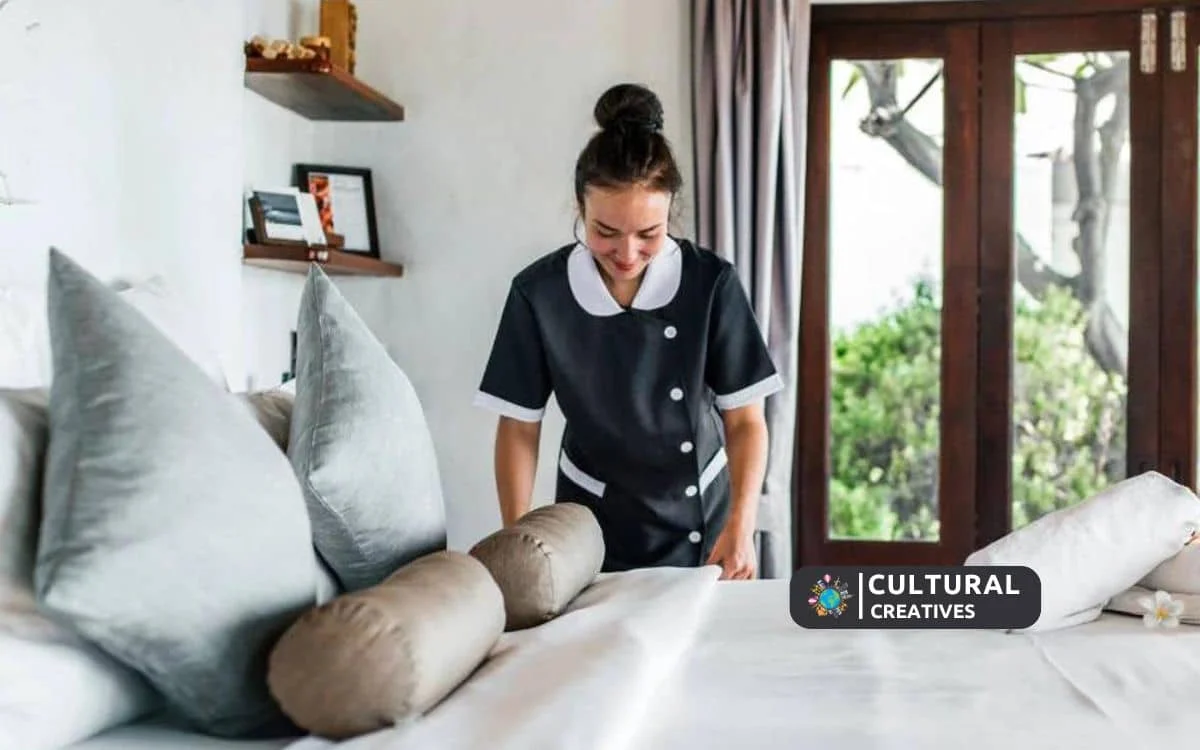On average, cleaning a hotel room takes between 30 minutes to an hour. The exact time can vary based on room size and the level of service required.
Cleaning a hotel room is a crucial operation that plays an essential role in ensuring guest satisfaction and maintaining high standards of hygiene. Hotel room cleaning is an art that combines efficiency and attention to detail, aiming to provide a welcoming environment for guests.
The time taken to clean a room can differ depending on factors such as the size of the room, the number of amenities to be replenished, and the thoroughness of the cleaning process. Hotel staff are trained to be meticulous and methodical, ensuring every corner of the room is attended to and in immaculate condition for the next occupant. Success in this task hinges on a well-organized procedure and the proficiency of the cleaning personnel. With a steadfast commitment to cleanliness, hotels can ensure a pleasant stay for all their guests.
Introduction To Hotel Room Cleaning
A spotless hotel room is the hallmark of a great stay for any traveler. The process of cleaning is vital to guest satisfaction. As guests check out each morning, an army of workers starts the race against time. Each room must look pristine before new guests arrive. Thus, understanding the cleaning process is crucial.
Cleaning a hotel room is not just about making the bed. It’s an art that balances speed and attention to detail. It’s a system that ensures safety, comfort, and a welcoming atmosphere for each guest. This cleanliness can make or break a hotel’s reputation. So, how long does the cleaning take? Various factors come into play.
Importance Of Timeliness And Efficiency
Efficiency is critical in this line of work. Housekeepers balance swiftness with thoroughness. Guests expect a clean room without unreasonable waits. Thus, hotels strive to minimize the time spent cleaning each room. This quick turnaround is essential for guest satisfaction and business success.
Variables Affecting Cleaning Time
- Size of the room: Larger rooms demand more time.
- Condition left by the previous guest: Rooms may require extra work if the prior guest left a mess.
- Hotel’s cleaning standards: High standards can result in longer cleaning times.
- Amenities to be replenished: More amenities mean more tasks.
| Factor | Impact on Cleaning Time |
|---|---|
| Room size | Directly Proportional |
| Room condition | Variable |
| Cleaning standards | Increase time |
| Amenities | Add tasks & time |
Standard Cleaning Expectations
Guests expect spotless rooms when they check in. A well-cleaned hotel room considers hygiene, tidiness, and attention to detail. Cleaning staff have a set amount of time to refresh each room. Typically, maids take 20-30 minutes for standard cleaning. This varies based on room size and hotel policies.
Checklists And Protocols
Cleaning protocols guide maids through each step. They start with removing used linens and trash. Next, they move to dusting, vacuuming, and wiping surfaces. Every corner must be dirt-free. Clean linens and amenities follow. Checklists ensure nothing is missed.
- Remove soiled items
- Clean bathroom thoroughly
- Dust and sanitize surfaces
- Restock supplies and amenities
- Final inspection for completeness
Guest Satisfaction Metrics
The quality of cleaning is critical to guest satisfaction. Ratings and feedback reflect the cleanliness standard. A refreshed room includes:
| Area | Cleanliness Level |
|---|---|
| Bathroom | Sanitized and sparkling |
| Bedroom | Linen fresh, space organized |
| Overall Room | Uncluttered, no odors, impeccable |
Surveys and online reviews give valuable insights. Hotels use them to measure success and improve processes.
Types Of Hotel Rooms
Cleaning hotel rooms is a versatile task, highly influenced by the type of accommodations provided by the hotel. Different hotel rooms vary in features, design, and size, making the time it takes to clean them differ significantly. Understanding the types of hotel rooms can help us better estimate the cleaning time required.
Differences Between Room Sizes
The size of a hotel room greatly impacts the duration of cleaning. Smaller rooms often take less time to clean compared to larger ones. Here’s a basic breakdown:
- Single rooms: Usually for one person, quickest to clean.
- Double rooms: Ideal for two, require slightly more time.
- Family rooms: Larger spaces, longer cleaning process.
Suites Versus Standard Rooms
Cleaning suites versus standard rooms carry distinct requirements:
| Suites | Standard Rooms |
|---|---|
| Multiple rooms within a suite. | Single room layout. |
| Often include a kitchenette or living area. | Basic amenities. |
| Require more elaborate cleaning. | Quicker to tidy up. |
In essence, suites demand more time for a thorough clean due to the additional living spaces. In contrast, standard rooms usually offer a more streamlined cleaning process thanks to their simplicity.
Timing The Cleaning Process
Timing the Cleaning Process in the hotel industry is a vital operation that directly impacts guest satisfaction and turnover rates. Efficiently cleaned rooms ensure that hotels maintain a steady flow of guests without unnecessary delays. Let’s explore how long it usually takes to clean a hotel room and the strategies used to enhance cleaning efficiency.
Average Cleaning Times Per Room Type
Cleaners tackle various room types, each presenting unique challenges and requiring different amounts of time.
| Room Type | Average Cleaning Time |
|---|---|
| Single Room | 20-30 minutes |
| Double Room | 30-45 minutes |
| Suite | 45-60 minutes |
These times can vary based on the extent of cleaning required and other factors.
Faster Turnaround Techniques
Streamlining cleaning processes boosts productivity and room availability. Here are key strategies:
- Prep work: Gather all tools and supplies beforehand.
- Checklists: Use detailed checklists for consistency and speed.
- Team cleaning: Assign roles to staff for shared tasks and efficiency.
- Time-saving tools: Invest in equipment that speeds up cleaning.
- Training: Regular training updates on best practices reduce cleaning time.
By applying these techniques, hotels can significantly reduce the time spent on each room.
Effective Cleaning Strategies
Clean hotel rooms ensure guest satisfaction. Quick and thorough cleaning holds the key. Hotels aim for rapid turnover without compromising cleanliness. Successful strategies make all the difference.
Methodical Approach To Cleaning
An organized plan leads to efficient cleaning. Cleaners start in the bathroom, move to bedroom areas, and finish with the floors. This avoids dirt transfer, saving time and effort.
- Strip and remake beds first.
- Disinfect frequently touched surfaces next.
- Vacuum last to catch any fallen debris.
Each step follows an order, ensuring a thorough process. Teams use checklists to hit every mark. This approach maximizes speed and efficiency.
Time-saving Cleaning Tools And Products
The right tools make cleaning swifter. Advanced products and devices reduce effort and increase pace.
| Tool/Product | Use |
|---|---|
| Multipurpose Cleaners | Clean multiple surfaces with a single solution. |
| Microfiber Cloths | Trap dirt effectively, reducing cleaning time. |
| Cordless Vacuums | Move freely, without plugging and unplugging. |
Staff equip themselves with these tools to stay ahead. Bulk dispensers save time refilling. Pre-moistened wipes offer a quick clean-up option. Every second counts.
Role Of Housekeeping Staff
Housekeeping staff are the unsung heroes of a hotel. They ensure guests walk into a fresh and clean room, ready for a relaxing stay. The time it takes to clean a hotel room depends greatly on the efficiency and expertise of these dedicated workers. Their tasks range from changing linens to sanitizing surfaces, all within a strict timeframe to prepare for the next guest.
Training For Efficiency
Effective training is crucial for housekeeping staff. It enables them to clean rooms both quickly and thoroughly. Training programs may include:
- Proper use of cleaning tools and chemicals
- Time management skills
- Attention to detail for spotless rooms
- Refreshing bed linens and towels efficiently
Staff are often trained using a checklist to ensure every task is completed to the highest standards.
Staffing Levels And Room Assignment
A hotel’s ability to clean rooms swiftly relies on having the right number of staff. Optimal staffing levels help to maintain a flow of clean rooms. Hotels often use a room assignment system to:
| Task | Goal |
|---|---|
| Distribute workload | Balance duties among staff |
| Track progress | Ensure timely completion |
| Monitor room status | Keep front desk updated |
The right combination of training and staffing helps housekeeping deliver impeccable rooms for every guest, every time.
Technology In Housekeeping
Housekeeping has stepped into the future. Modern hotel stays sparkle with tech-savvy cleanliness. Technology plays a crucial role, slashing the time it takes to turn rooms over. Guests revel in pristine spaces, thanks to cutting-edge solutions.
Innovations In Cleaning
Hotels are turning to innovation to keep rooms spotless. Below are key advancements:
- Robotic Vacuums: These gadgets sweep and mop autonomously.
- UV Sanitation: Powerful UV lights eliminate germs effortlessly.
- Electronic Dispensers: They ensure precise cleaning agent use.
- Mobile Apps: Apps help staff track tasks in real-time.
Impact Of Automation On Cleaning Times
Automation redefines efficiency. Here’s how:
| Traditional Cleaning | Automated Cleaning |
|---|---|
| Manual Tools | Robotic Assistance |
| Chemical Guesswork | Precise Dispensing |
| Time-Consuming | Speedy Turnover |
Automated systems trim down cleaning times with remarkable precision and reliability. Staff can focus on finer details, which enhances guest experience. Efficiency gains here translate into crisp, ready rooms faster than ever.
Challenges In Cleaning
Cleaning hotel rooms is like tackling a puzzle. Every piece must fall in the right place to satisfy guests. Housekeepers face daily challenges to keep rooms spotless and welcoming.
Dealing With Unexpected Messes
Unexpected messes can throw a wrench into the routine. Each hotel room holds a surprise. Guests leave behind anything from spilled wine to scattered toys. Housekeepers need quick thinking and a stocked cart to address these challenges:
- Overflowing trash – calls for extra bags and swift disposal.
- Stained linens – require spot treatment or complete replacement.
- Broken items – must be reported and sometimes fixed on the spot.
Time is precious. Yet, these unforeseen issues must be resolved to ensure the next guest’s comfort.
Balancing Quality With Quickness
Housekeepers aim to combine speed with thoroughness. Each room must sparkle, yet time is limited. They follow a streamlined process:
| Task | Average Time |
|---|---|
| Making beds | 5 minutes |
| Cleaning bathrooms | 7 minutes |
| Vacuuming | 10 minutes |
| Dusting | 3 minutes |
| Final touches | 5 minutes |
Housekeepers focus on critical areas like bathrooms and sleeping areas. They use smart techniques and tools to clean effectively:
- Multipurpose cleaners save time and space in the cart.
- Microfiber cloths catch more dust and dry surfaces quickly.
- Checklists ensure no task is overlooked even when rushing.
Every second counts. But, the promise of quality never dims, even under the pressure of the clock.
Conclusion
Cleaning a hotel room efficiently combines skill with established procedures. Time varies by room size and staff expertise. Strive for thoroughness while optimizing each movement. Remember, guests’ satisfaction hinges on cleanliness. A well-cleaned room is the hallmark of an excellent stay, reinforcing the hotel’s reputation and encouraging repeat business.






